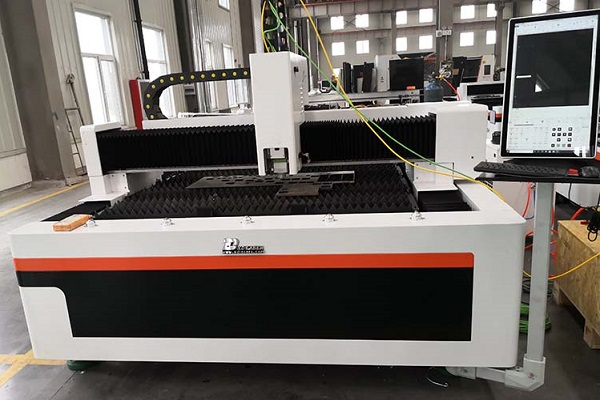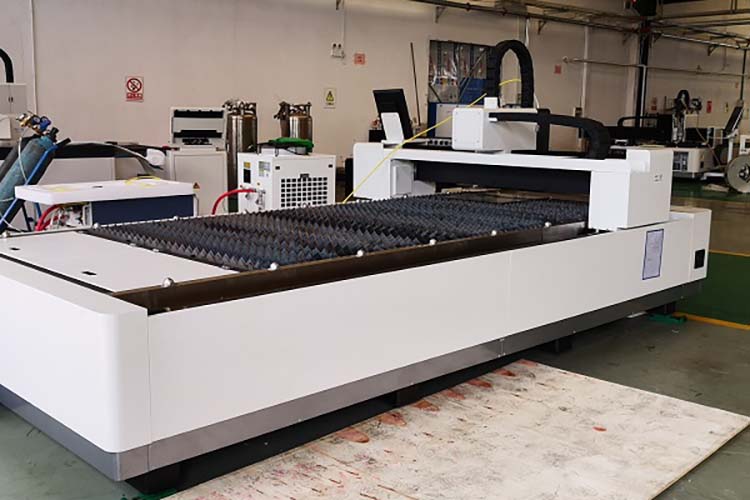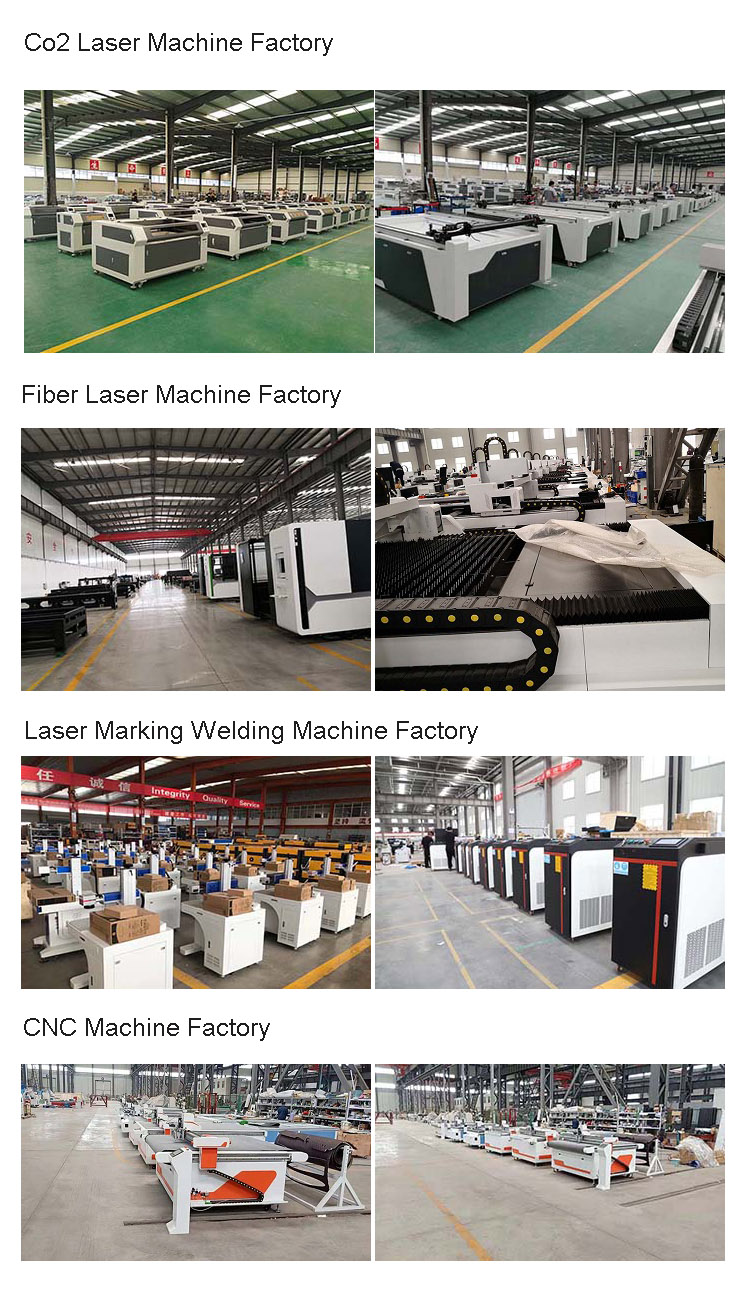Fiber Laser Cutting Machine For Stainless Steel Carbon Steel Video:
Características:
1. High configuration, strong cutting ability and high-power cutting.
2. Exquisite beam quality: smaller focus spot, finer cutting lines, higher work efficiency and better processing quality;
3. Cutting speed: twice that of CO2 laser cutting machine with the same power;
4. Stability: imported fiber laser of world brand is adopted, with stable performance and service life of key components up to 100000 hours;
5. Electro optical conversion efficiency: the optical conversion efficiency of fiber laser cutting machine is three times higher than that of CO2 laser cutting machine, which is energy-saving and environmental friendly;
6. Operating cost: the power consumption of the whole machine is only 20-30% of that of similar CO2 laser cutting machines;
7. Maintenance cost: no laser working gas; Optical fiber transmission without reflector; It can save a lot of maintenance costs;
8. The product is easy to operate and maintain: optical fiber transmission, without adjusting the optical path;
9. Super flexible light guide effect: small volume, compact structure, easy to meet the requirements of flexible processing.
Metal Fiber Laser Machine Details:
Información técnica:
Modelo | XD-3015F Fiber Laser Cutting Machine |
Área de trabajo | 3000*1500mm |
Z-axis Travel Length | 0-200mm |
Laser Power | 1000W,1500W,2000W,3000W,4000W,6000W |
Working Table Type | Sawtooth working table suitable for cutting any metal and suitable for loading heavy metal. |
Cutting Ability | Stainless steel 10mm,carbon steel up to 20mm |
Maximum Idle Running Speed | 120m/min |
Position Speed | 100m/min |
Accelerated Speed | 1.5G |
Repeated Position Accuracy | ±0.03mm |
Transmisión | Double Guide rails and double Racks |
Optical Lens Brand | Raytools,sWavelength |
Equipo auxiliar | Nitrogen producer,air filter,material loader,Auto partitioned exhausted system |
Graphic Format Supported: | AI, PLT, DXF, BMP, Dst, Dwg, LAS, DXP, IGES |
Auxiliary Gas | Oxygen, Nitrogen |
El consumo de energía | 23.5KW |
Tensión de trabajo | 380V/50Hz |
Capacidad de carga | 1200 kgs |
Machine size including Packing | One table machine: 5m*2.3m*1.8m Two table machine: 8.5m*2.3m*1.8m Protect cover machine: 9m*2.4m*2m |
Peso bruto | One table machine: 4000kgs, two table machine: 5000kgs, Protect cover machine: 6000kgs |
Full Protect cover or not | Opcional |
Exchange table or not | Opcional |
Laser wave length: | 1064 nm |
Partes consumibles | Nozzle,lens,protect mirror |
Embalaje:
We will pack the machine to avoide water come during long time shipment.
Servicio postventa:
1. Every machine well installed and tested before delivery.
2.3 years guarantee time.
3. Whole life free technical support. Whenever you need us, we are here willing to help you.
Application of various auxiliary gases in laser cutting
Since the first laser was produced by human beings in 1960, laser has been continuously applied in various fields since the medical field.
Since the 1970s, laser technology has gradually entered the field of industrial cutting. Until today, laser cutting equipment has been widely used in enterprises. However, due to the popularity of laser cutting equipment, the product price competition among enterprises has become increasingly fierce, which has led to the decline of the profitability of laser cutting equipment in enterprises, At present, the whole processing and manufacturing industry needs transformation and upgrading, and enterprises need to focus their funds on more value-added production links such as process improvement, efficiency improvement and increasing R & D investment. How to reduce the use cost of laser cutting equipment is very urgent. This paper will focus on the discussion of using air as auxiliary gas to reduce the cutting cost in the process of laser cutting.
Influence of different auxiliary gases on cutting quality
First of all, let's understand the process of laser cutting: after passing through the lens, the laser generated by the vibrator is converged at one point to form a very small spot. By accurately controlling the distance between the lens and the plate, we can ensure that the laser spot is stable at a certain position in the material thickness direction. At this time, due to the convergence of the lens, the laser energy with very high power density is concentrated at the spot, The power density can usually reach 106 ~ 109w / cm2. The material melts instantly after absorbing the spot energy. The cutting process is completed by blowing the molten liquid away from the material with auxiliary gas.
In the whole cutting process, the main function of auxiliary gas is to form a driving force to remove the molten metal liquid from the material itself. In this process, different kinds of gases have different effects on the material and section:
01. When oxygen is used as auxiliary gas
Mientras se despierta el líquido de metal fundido, se producirá una reacción de oxidación para promover la fusión endotérmica del metal, para realizar la fusión de materiales más gruesos. Este proceso mejorará significativamente la capacidad de procesamiento del láser. Pero al mismo tiempo, debido a la existencia de oxígeno, la sección de corte del material obviamente se oxidará, y el efecto de enfriamiento se producirá en los materiales alrededor de la sección de corte, lo que mejora la dureza de esta parte del material y tiene un cierto impacto en el procesamiento posterior.
02. Cuando el nitrógeno se usa como gas auxiliar
Se formará una atmósfera protectora alrededor del líquido de metal fundido para evitar que el material se oxida, para garantizar la calidad de la sección de corte. Pero al mismo tiempo, debido a que el nitrógeno no tiene capacidad de oxidación y no puede mejorar la transferencia de calor, no ayudará a mejorar la capacidad de corte como el oxígeno. Además, cuando se usa nitrógeno como gas auxiliar, el consumo de nitrógeno es grande, lo que resulta en un mayor costo de corte que cuando se usan otros gases.
03. Composición del aire en gas
El nitrógeno representa aproximadamente el 78% y el oxígeno representa aproximadamente el 21%. Cuando se usa el aire como gas auxiliar para cortar, la reacción de oxidación de la sección de corte debe ocurrir debido a la existencia de oxígeno, pero al mismo tiempo, debido a la existencia de una gran cantidad de nitrógeno, la reacción de oxidación traída por el oxígeno no lo es Lo suficiente para mejorar la transferencia de calor y la capacidad de corte no mejorará, por lo tanto, el efecto del corte de aire puede entenderse entre el corte de nitrógeno y el corte de oxígeno, y la ventaja es que el costo del corte de aire es muy bajo. Todos los costos son el consumo de energía causado por el compresor de aire para proporcionar aire y el consumo del elemento de filtro en la tubería de aire.
Acerca de xdlaser:
Bienvenido a contactar xdlaser para más detalles:
Whatsapp: +86-15169026664
Skype/Wechat: Juliali01
Correo electrónico: julia@xdlasers.com






















